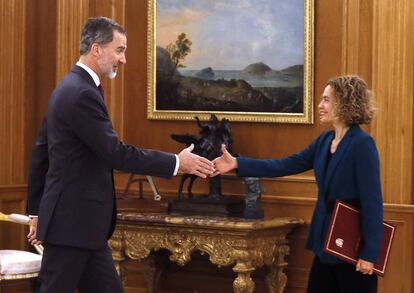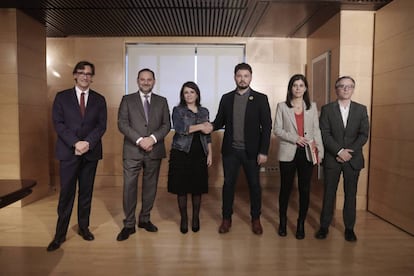Spain’s King Felipe begins new round of meetings with party leaders
After another inconclusive election, the Socialist Party’s prime ministerial candidate, Pedro Sánchez, says he will only submit to a congressional vote if he has enough support

King Felipe VI of Spain began meeting with political leaders on Tuesday to determine whether Pedro Sánchez of the Socialist Party (PSOE), who won the inconclusive repeat election of November 10, stands a chance of being endorsed by parliament as the new head of government.
The round of talks with party chiefs is a procedural step meant to ascertain whether there is a viable candidate for an investiture vote. The caretaker prime minister, who earned 120 seats in the 350-seat Congress of Deputies, has been struggling to secure enough backing from other parties to ensure his confirmation in office.
The PSOE had been hoping to form a government before the end of the year
Sánchez’s success could hinge on a Catalan separatist party whose leader, Oriol Junqueras, was recently sentenced to 13 years in prison over his role in the 2017 failed breakaway attempt from Spain. The Catalan Republican Left (ERC) has not yet decided whether to endorse Sánchez, and recently said that any deal would probably take place “after Christmas or after New Year’s Eve,” dampening the PSOE’s hopes of having a government in place before the end of the year.
The ERC and the PSOE have been holding talks – the latest one is scheduled for Tuesday in Barcelona – and the situation of separatist politicians in prison for sedition is one of the topics on the table, confirmed ERC spokeswoman Laura Vilalta.
Vilalta encouraged Sánchez to “make a move” if he wants to speed up his own reappointment. “If there is a willingness by the PSOE to activate the political channels, there need to be gestures,” she said. If there is no agreement, the ERC will not hesitate to vote no at the investiture session rather than offer an abstention, she added.

Failed bids
The next step after the round of talks with the king is an investiture session where the candidate must secure an absolute majority of votes, or go to a second round where only more yes than no votes are required.
It will be the third time this year that the Spanish monarch and party leaders have gone through this procedure, reflecting the new political fragmentation in a country that has held four national elections since December 2015. Spain has spent a good chunk of this four-year period under caretaker governments.
Sánchez has stated that he will not submit to a vote unless he is guaranteed enough backing to win. He is due to meet with Felipe VI on Wednesday. On Tuesday, the monarch will hold talks with representatives from regional parties, including Compromís from Valencia, the Canaries Coalition and Galicia in Common.
The Socialist leader has already submitted to two failed investiture votes in the past: one in March 2016 and again in July of this year. In late May 2018, Sánchez led a successful no-confidence motion against Mariano Rajoy of the Popular Party (PP) and became the new prime minister of Spain, but was unable to secure approval for his budget plan, leading to early elections in April 2019.
English version by Susana Urra.
Tu suscripción se está usando en otro dispositivo
¿Quieres añadir otro usuario a tu suscripción?
Si continúas leyendo en este dispositivo, no se podrá leer en el otro.
FlechaTu suscripción se está usando en otro dispositivo y solo puedes acceder a EL PAÍS desde un dispositivo a la vez.
Si quieres compartir tu cuenta, cambia tu suscripción a la modalidad Premium, así podrás añadir otro usuario. Cada uno accederá con su propia cuenta de email, lo que os permitirá personalizar vuestra experiencia en EL PAÍS.
¿Tienes una suscripción de empresa? Accede aquí para contratar más cuentas.
En el caso de no saber quién está usando tu cuenta, te recomendamos cambiar tu contraseña aquí.
Si decides continuar compartiendo tu cuenta, este mensaje se mostrará en tu dispositivo y en el de la otra persona que está usando tu cuenta de forma indefinida, afectando a tu experiencia de lectura. Puedes consultar aquí los términos y condiciones de la suscripción digital.








































